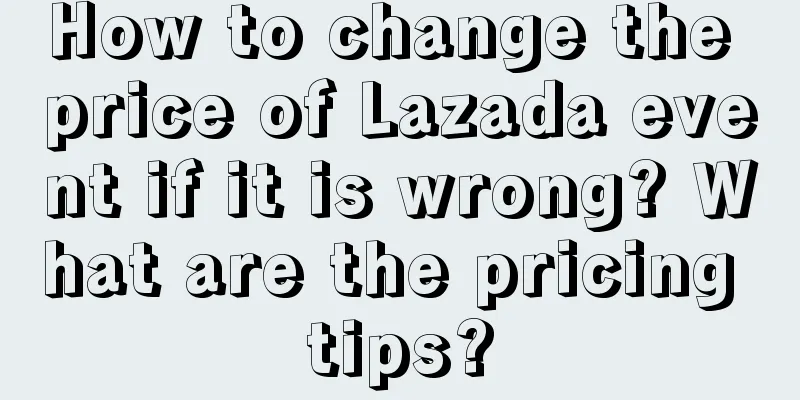How to fill in the business type when registering on Amazon? What can I fill in?

|
To open a store on Amazon, the first thing to do is to register. However, there will also be a business type when registering, so how do you fill in such a business type? Many people get stuck at this step and cannot proceed to the next stage. In order to allow everyone to complete the store opening process as soon as possible, let’s talk about it below. 1. Fill in the business type for Amazon registration Before you prepare to register an Amazon account, you first need to understand the main types of Amazon accounts. Strictly speaking, there are four main types of Amazon accounts: VC, VE, professional, and individual sellers. vc account, this type of account must first be a US company's application qualification, and must also be a company or brand recognized by Asia. For example, if the product sells very well offline, Asia also sees its potential and product profits, then it may invite you. ve account, this type of account is completely different from the invited account of Ya. This type of account usually thinks that their products are competitive, or that their products can bring certain profits to Ya, and they apply to become suppliers. The nature of ve is to be a supplier to Ya, sell our products to Ya, and let Ya help operate the account. However, the channels for vc and ve accounts were closed in the past two years, so the accounts applied for by ordinary small and medium-sized sellers were all professional and personal accounts. Therefore, you can choose a personal account or a professional account according to your business type. 2. What can I fill in? Therefore, currently you can fill in professional and personal seller accounts. The connection between them: First of all, you should know that newly registered accounts are all professional sellers by default, and professional and individual sellers can be switched between each other. So when should you switch to a professional seller and when should you switch to an individual seller? Newbies are advised to choose professional sellers if they want to continue to run their accounts and have long-term development on the platform. If you want to make Adam a side job, you can switch to being an individual seller, which is fine. The difference between personal and professional accounts: First of all, a professional store has to pay monthly rent every month, but if it is a personal store, there is no need to pay monthly rent. In addition, the number of professional listings is unlimited, that is, the number of listings on Ya is unlimited. If the store is a personal Ya store, then the number of listings can only be uploaded 40 per month. From these two points of view, if you have more SKUs, or more products, it is better to be a professional seller. Currently, the only options for registered business types on Amazon are individual or professional sellers. If it is not one of these two options, you cannot write any other options. If you want long-term development, you can consider choosing a professional seller, which will be more useful. If you don’t want to invest too much experience, you can consider being an individual seller. |
<<: How to ship after Wish has placed an order? Do I need to mark the shipment in the backend?
>>: How do Amazon products pay taxes? What are the taxes based on?
Recommend
Alibaba's ChatGPT "Tongyi Qianwen" is officially announced! Tmall Genie and DingTalk's new features are revealed
At the 2023 Alibaba Cloud Summit, Zhou Jingren, CT...
The Games are over, let’s look at the value of Olympic creativity
With the successful conclusion of the Olympic Game...
How to play the lucky draw notes on Xiaohongshu? Just read this article!
The lucky draw function should be familiar to Xiao...
How does a data analyst write a "useful" analysis report?
Many data analysts are trapped in the endless coll...
Do 3C products on Shopee need to be certified? How to upload products on Shopee?
We know that some e-commerce platforms require cer...
How to ship orders from Shopee? What is SLS?
Cross-border e-commerce is quite popular nowadays,...
The gray market of hotel agents: 0 inventory, 40% profit from price difference, 160,000 yuan a month
For the platform, the gray industry is a cancer th...
Does it cost money to open a cross-border e-commerce store? What kind of money is needed?
The information, qualifications and fees required ...
10,000 words of practical information: User growth can be so simple (40 pictures)
I believe everyone may have had this feeling in th...
How can tea brands expand in scale? Share the successful experience of Bawang Chaji in starting a business
Tea brands have a large share in the market. How d...
Is Alibaba International Station reliable? What are its advantages?
There are many merchants doing cross-border e-comm...
Review interviews and salary negotiations, you will definitely need it
Introduction: This article is an interview and job...
How is Shopee's cross-border e-commerce? How to join Shopee?
With the development of cross-border e-commerce, m...
How to advertise on Wish? What is the method?
As one of the cross-border e-commerce platforms, W...
The live broadcast of card opening that has made countless netizens addicted, with an investment of several thousand, can you earn 20,000 yuan a month?
A new form of live streaming, which induces consum...









